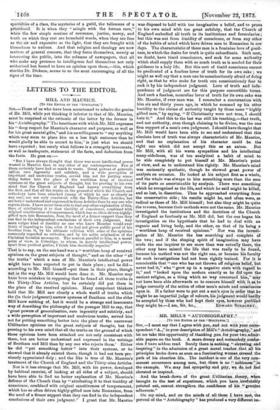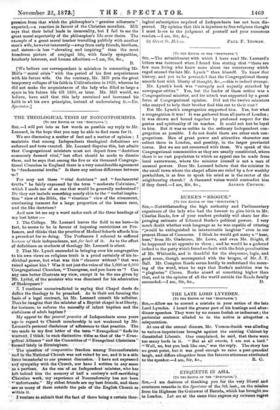MR. MILL'S "AUTOBIOGRAPHY."
[To THE EDITOR OF THE "SPUTA-TOR:1
SIR, —I must say that I agree with you, and not with your corre- spondent "A.," in your description of Mill's "Autobiography," and let me take this opportunity of thanking you for your two admir- able papers on the book. A more dreary and melancholy confes- sion I have seldom read. Surely there is nothing " elevating ,and inspiring" in the admission of a great moral teacher that all his principles broke down as soon as a fascinating woman crossed the path of his cheerless life. The incident is one of the very com- monest occurrence among men, but there is no " nobleness "in the example. We may feel sympathy and pity, we do not feel elevated or inspired.
And the break-down of the great Utilitarian theory, when brought to the test of experience, which you have irrefutably pointed out, cannot strengthen the confidence of his "genuine adherents."
On my mind, and on the minds of all those I have met, the perusal of the " Autobiography " has produced a very different im- pression from that which the philosopher's " genuine adherents" expected,—a reaction in favour of the Christian moralists. Mill says that their belief leads to immorality, but I fail to see the great moral superiority of the philosopher's life over theirs. The example of a great moral teacher travelling publicly with another man's wife, however innocently—away from early friends, brothers, and sisters—is less "elevating and inspiring" than the most humdrum picture of conjugal life, with family sympathies, brotherly interests, and human affections.—I am, Sir, &c., B.
[We believe our correspondent is mistaken in connecting Mr. Mill's " moral crisis" with the- period of his first acquaintance with his future wife. On the contrary, Mr. Mill puts the great temporary collapse of his faith in Utilitarianism in 1826, whereas he did not make the acquaintance of the lady who filled so large a space in his future life till 1830, or later. Mr. Mill would, we believe, have said that this lady sustained and increased his faith in all his own principles, instead of undermining it.—En. Spectator.]



































 Previous page
Previous page